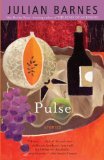Summary | Excerpt | Reading Guide | Reviews | Beyond the Book | Readalikes | Genres & Themes | Author Bio

Stories
by Julian Barnes
Jane didn't know what to think. She was half in a panic. She reached for a sudden fact. "It's the largest town in England without a university."
"How do you know that?" Alice asked, trying to appear envious.
"Oh, it's just the sort of thing I know. I expect I got it from Moby-Dick."
They laughed contentedly, complicitly. Silence fell. After a while they passed Reading, and each gave the other credit for not pointing out the Gaol or going on about Oscar Wilde. Jane went to the loo, or perhaps to consult the minibar in her handbag. Alice found herself wondering if it were better to take life seriously or lightly. Or was that a false antithesis, merely a way of feeling superior? Jane, it seemed to her, took life lightly, until it went wrong, when she reached for serious solutions like God. Better to take life seriously, and reach for light solutions. Satire, for instance; or suicide. Why did people hold so fast to life, that thing they were given without being consulted? All lives were failures, in Alice's reading of the world, and Jane's platitude about turning failure into art was fluffy fantasy. Anyone who understood art knew that it never achieved what its maker dreamt for it. Art always fell short, and the artist, far from rescuing something from the disaster of life, was thereby condemned to be a double failure.
When Jane returned, Alice was busy folding up the sections of newspaper she would keep to read over her Sunday-night boiled egg. It was strange how, as you aged, vanity became less a vice and almost its opposite: a moral requirement. Their mothers would have worn a girdle or corset, but their mothers were long dead, and their girdles and corsets with them. Jane had always been overweight - that was one of the things Derek had complained about; and his habit of criticising his ex-wife either before or shortly after he and Alice went to bed together had been another reason for finishing with him. It wasn't sisterliness, more disapproval of a lack of class in the man. Subsequently, Jane had got quite a bit larger, what with her drinking and a taste for things like buns at teatime. Buns! There really were a few things women should grow out of. Even if petty vices proved crowd-pleasing when coyly confessed into a microphone. And as for Moby-Dick, it had been perfectly clear to all and sundry that Jane had never read a word of it. Still, that was the constant advantage of appearing with Jane. It made her, Alice, look better: lucid, sober, well-read, slim. How long would it be before Jane published a novel about an overweight writer with a drink problem who finds a god to approve of her? Bitch, Alice thought to herself. You really could do with the scourge of one of those old, punitive religions. Stoical atheism is too morally neutral for you.
Guilt made her hug Jane a little longer as they neared the head of the taxi queue at Paddington.
"Are you going to the Authors of the Year party at Hatchards?"
"I was an Author of the Year last year. This year I'm a Forgotten Author."
"Now, don't get maudlin, Jane. But since you're not going, I shan't either." Alice said this firmly, while aware that she might later change her mind.
Excerpted from Pulse by Julian Barnes. Copyright © 2011 by Julian Barnes. Excerpted by permission of Knopf, a division of Random House, Inc. All rights reserved. No part of this excerpt may be reproduced or reprinted without permission in writing from the publisher.
At times, our own light goes out, and is rekindled by a spark from another person.
Click Here to find out who said this, as well as discovering other famous literary quotes!
Your guide toexceptional books
BookBrowse seeks out and recommends the best in contemporary fiction and nonfiction—books that not only engage and entertain but also deepen our understanding of ourselves and the world around us.